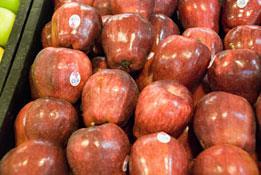
The recent huge backlog of containers at Indonesian ports resulting from the implementation of new import licensing rules at the end of October might be clearing. But the trade is counting a serious cost, and bracing itself for the further disruption at the end of this month, when new laws on labelling take effect.
As part of an overhaul of its laws on horticultural imports, the Indonesian government last month introduced a new regulation requiring all fruit and vegetable importers to re-register and obtain import permits. Under the new rules, after gaining a licence to import, importers must acquire a permit from the Ministry of Agriculture each time they want to import horticultural products, and this permit has to be approved by the Ministry of Trade.
While the somewhat complex procedures are aimed at preventing unauthorised importers from bringing in product illegally, efforts to implement them at the end of October caused an administrative logjam, and ultimately resulted in the detainment of hundreds of containers at Indonesian ports.
“The implementation was chaos,” said one leading local industry source who preferred to remain unnamed. “More than 2,000 applications had to be processed, the administration process was slow, and many importers got the wrong number of containers in the licence. Some importers got a ridiculously low number, some got a much bigger number then they’d applied for. There were also many companies that are not licensed horticultural importers being granted a permit to import. The system of getting approval from the Ministry of Trade was equally chaotic and long delays occurred as predicted.”
Amid the administrative confusion, shipments of fruit and vegetables began to arrive at the ports of Medan, Jakarta and Surabaya. “A huge backlog of containers built up at these ports from 28 October as shipments were detained,” said the industry source. “Several unconfirmed reports stated that more than 1,500 containers were being detained. Many of the refrigerated containers were left unplugged because of the poor facilities at several ports. The losses have reached several million US dollars.”
Facing a mounting crisis, the government was ultimately forced to postpone its original deadline. Last week, the Ministry of Trade and Ministry of Agriculture issued a letter that gave Indonesian importers until 28 November to clear any containers of fresh produce imports without a licence and permit. The importers now have until 31 December 2012 to process their licences and permits to cover any shipments that arrive before 28 November. The Indonesian Customs Department has reportedly been slow to recognise the letter, resulting in continued and unnecessary delays in clearing shipments.
Despite the release of containers, confusion appears to reign in the Indonesian import trade. Indonesian importers are puzzled by the new laws, according to local sources, and they don’t have full assurance that they will be able to continue to do business in the future.
Risk of further backlogs
Furthermore, new technical regulations on the labelling of imported produce, which are due to take effect on 28 November, threaten to cause further delays in the coming weeks.
“With effect from 28 November, every container will need to be inspected at the port of loading to ensure it is labelled to show information such as the point of origin, the volume and the safety of packaging,” said one importer. “This creates logistical headaches for exporters and a further risk that containers arriving after 28 November will be detained.”
The regulations on import licensing and labelling form part of a series of laws introduced by the Indonesian government this year to control horticultural imports.
On 19 June, the Indonesian government limited the number of seaports through which horticultural products could enter the country to just four, which, significantly, excluded Jakarta Port. Access via Jakarta Port is now restricted to supplying countries that have negotiated a mutual recognition agreement (MRA) with Indonesia, namely the US, Australia, New Zealand and Canada. Other countries must ship their products via Surabaya Port, Medan Port or Makassar Port.
Counting the costs
China, which accounted for 74 per cent of all Indonesia’s temperate fruit imports last year by volume, appears to have been a target of the new port restrictions, which have pushed up costs. Importers report that routing a container of fruit to Jakarta via Surabaya Port costs between US$4,000 and US$7,000 more than shipping directly into Jakarta.
The price of all horticultural imports has been escalating on the back of Indonesia’s raft of new regulations, however, according to the leading local industry source. “The price of US apples has gone up from US$30-32 per carton to US$45 per carton, and the price of US grapes has climbed to more than US$120 per carton.'
Indeed, he believes the new laws on horticultural imports will have significant and far-reaching effects on the local economy that the government has failed to appreciate.
“The problem is huge, and the government has not realised it yet,” he says. “It’ll be like a domino effect. First you have huge inflation, then a shortage of fresh produce, which in turn affects the quality of life in Indonesia. The retailers will have to postpone their expansion programmes, and import businesses will have to close down. The customs authorities will lose revenue and we are facing the prospect of tens of thousands of people losing their jobs. The whole situation is uncertain and pretty bleak.”



